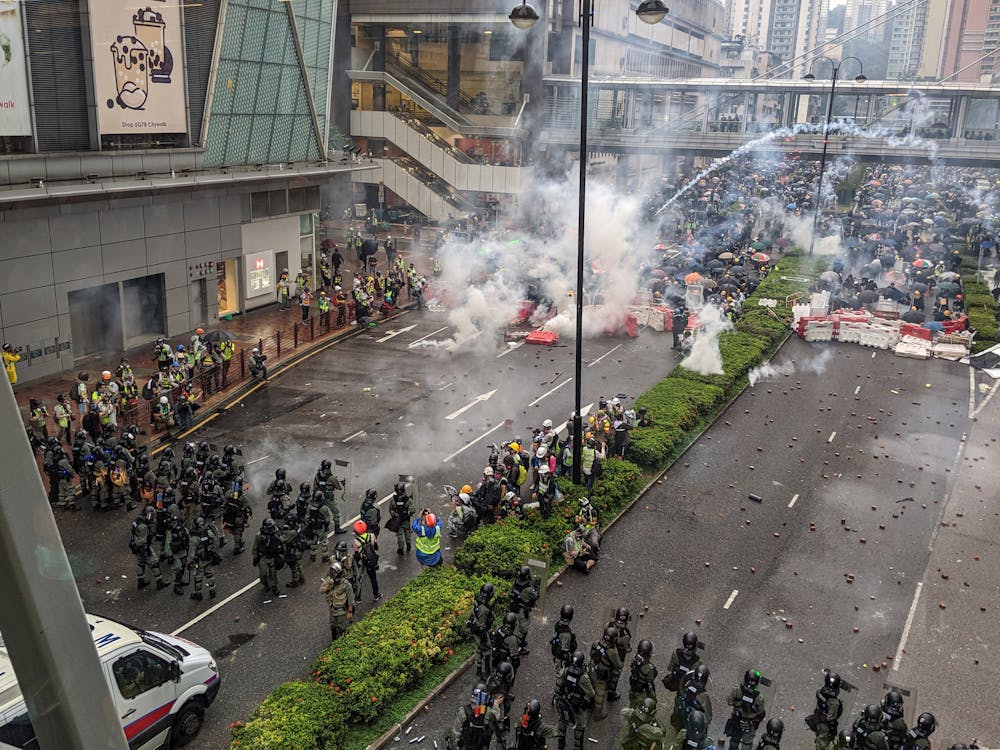Since COVID-19 began its spread in Wuhan, media attention on China has almost exclusively covered coronavirus, leaving behind violent demonstrations still present in citizens’ minds.
But mere months ago, Hong Kong residents were wearing a different type of mask—black, heavy, used to prevent tear gas. Last summer, demonstrations were sparked by a bill that would allow extraditions to mainland China, but have since evolved into a greater—and more violent—fight for the city’s identity and independence. The events in the last year have touched every person who has called the city home, including many of Duke’s international students and alumni.
Previously a British colony, Hong Kong returned to China in 1997 under Basic Law, which called for “one country, two systems” and promised a high level of autonomy until 2047. In the past two decades, the city has seen a gradual erosion of political and economic liberties—an increasingly pro-Beijing government whose chief executive must be approved by mainland China, an influx of mainlanders in the city leading to higher property prices and decreased job opportunities and most recently, the appointment of a patriotic hard-liner known for squashing Christian churches in eastern China to oversee Hong Kong.
In Fall 2019, junior Sophie Elliott was studying abroad in Hong Kong as the pro-democracy activists and local police turned up the heat. Alongside 11 other Duke students, she witnessed police throwing tear gas at large crowds, groups of protesters flooding onto the subway–prompting Elliott and her classmates to get off as a safety precaution–and resistance graffiti being painted on train station walls.
Towards the end of the semester, Hong Kong University, which Elliott was attending, had been so vandalized that students couldn’t use stairwells on campus to get to class. Eventually, the school moved to online classes and Duke asked its students to leave the city two weeks early.
“Typical study abroad is very relaxed and it wasn’t that,” Elliott said. “We had to be aware all the time, which can be tiring. But it was very cool being engaged in the city’s history.”
One member of the Trinity Class of 2019 spent the first 16 years of his life in Hong Kong, and his immediate family still lives in the city. As a result of the protests, both his mom and aunt lost their jobs in the tourism-driven economy. However, the alum said that if he did not have the privilege and resources to attend college and build a life overseas, he might have become a student protester himself.
“The number of university graduates often outnumber job positions that are available. It’s an employers’ market, businesses don’t need to offer much to hire them,” he said.
He added that of the jobs available in Hong Kong, a large proportion go to people who speak Mandarin—despite Hong Kong’s local language being Cantonese—because of how interconnected Hong Kong and mainland businesses have become.
“Such a small portion of Hong Kong people get to share the fruits of China’s rise, but a lot of us are beating the burden of China’s dominance,” he said.
However, one current senior, an international student from Hong Kong, called the protesters’ actions, which included throwing Molotov cocktails and other forms of physical violence, “extreme methods that I don’t really think are appropriate.”
The student recalled a coworker from the mainland who he got to know while working for JP Morgan’s China team in Hong Kong last summer. Several months later, he read in the news that the coworker was beaten up outside of the office after getting into an argument with a group of locals, in which he shouted in Mandarin, “We are all Chinese!”
“It's insane how people immediately judge all mainlanders to be bad,” the student said. “I personally have a lot of mainlander friends. If the Hong Kong people want to convince mainlanders that their cause is just, which I find to an extent reasonable, attacking people is not the way forward.”
First-year student Lindsay Hu, a Taiwanese international student who lived in Hong Kong for her entire adolescent life, said that the protests caused her an emotional burden during her first semester at Duke.
“It was pretty tough. I would see photos of places I [used to] go to every day on fire, people running away from tear gas,” she said. “I saw a picture of the [Mass Transit Railway] station under my mom's office on fire, and it just felt really wrong and I couldn't fully grasp the situation.”
Hu emphasized that the Hong Kong protests are not a standalone event, but instead should be seen as part of a greater trend of global civil unrest.
High-profile protests in Chile, Sudan, Algeria, Lebanon, India, France and other countries also shaped 2019, largely connected by grievances against income inequality, established elites and a loss of civil and political rights, according to an article by Time Magazine.
Even though the COVID-19 outbreak has recently made the city eerily quiet, the member of the Class of 2019 said that Hong Kong is not done fighting.
“There’s an exponential amount of frustration in the community and it’s only a matter of time before people go back to the streets,” he said. “But integration is inevitable.”
Editor's note: After recent actions by the Chinese government, The Chronicle updated this story in March 2021 to remove the names of two sources who are Hong Kong citizens.
Get The Chronicle straight to your inbox
Signup for our weekly newsletter. Cancel at any time.

